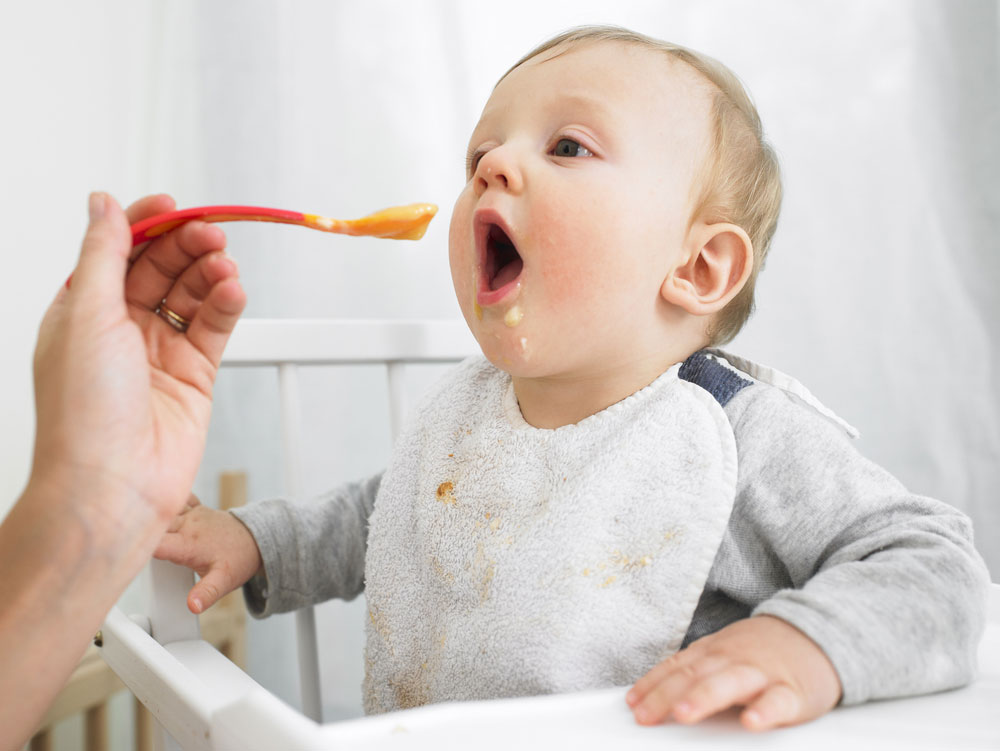5 Experts Answer: Is It OK to Give Babies Spicy Food?

Each week, MyHealthNewsDaily asks the experts to answer questions about your health.
This week, we asked pediatricians and nutrition experts: Can babies handle spicy food? Their answers have been edited and condensed for space.
Marilyn Tanner-Blasier, RD, pediatric dietitian at the Washington University School of Medicine in St. Louis and spokesperson for the Academy of Nutrition and Dietetics:
Things are changing: people are starting to be a little more open-minded about introducing new food to babies. The word on the street is, if you are eating spicy foods, and it's in your breast milk, then the kids will like the flavor later.
When you're introducing foods to kids, keep it simple initially – go ahead and start introducing table foods, what the family is eating. But keep in mind that if you're going to give them the adult version with all these spices and strong flavors, it may be too much. If they're refusing it, try to simplify the dish.
From the safety standpoint, you want to make sure to use fresh spices that haven't been sitting on the shelf for three or five years. People tend to set them on the shelf for a long period of time, and then they have things growing in them. If you feed children spices, check the expiration date.
***
Get the world’s most fascinating discoveries delivered straight to your inbox.
Dr. Anca Safta, pediatric gastroenterologist, director of endoscopy and assistant professor at the University of Maryland:
In infants there's a lot of debate on food introduction, even among pediatricians.
There's a difference between hot spices, and the aromatic ones. Aromatic ones — such as cinnamon, nutmeg, garlic, turmeric, ginger, coriander, dill and cumin — are perfectly fine to introduce to children, even in infancy after 6 months.
When introducing solid food, one should go ahead and try especially the aromatic foods. We live in a society where we think that baby foods have to be bland, but really you don't have to do that.
But I would not say the same for hot foods, per se. The hot part is not a taste, but rather involves stimulation of pain receptors, and infants might have a stronger and novel reaction to it, possibly creating an aversion.
There are pain receptors on the tongue and in the gut that are stimulated by spicy hot foods, specifically, a receptor called transient receptor potential vanilloid-1 (or TRPV-1), in the gut. Capsaicin — which makes peppers hot — binds to these receptors and sends pain signals to the brain. This is what creates the burning sensation on the tongue, pain in the gut and in some people, around the perianal area when defecating. Folks with irritable bowel syndrome can have bad reactions to spicy foods as a result of the stimulation of these receptors.
If we look all over the world, there are South American countries that eat a lot of hot foods, and there are many Asian countries that introduce it to kids early on. In some countries or cultures, spicy foods are introduced early, and with frequent usage — meaning it might be every day, it may be two or three times a week. Most children then become tolerant to different degrees of spiciness.
With aromatic spices, the only caution I would say is to introduce one new spice every four to five days, just to see if there's an adverse reaction.
***
Vanessa Kane-Alves, RD, clinical nutrition specialist for the Adolescent Medicine/Eating Disorders Program at Children's Hospital Boston
Whatever a mom wants to enjoy and eat [while breastfeeding], that's what she should be eating. For most moms, eating spicy food is perfectly fine, and can also help the babies be less picky when they are eating at the table, because they're being exposed to different foods in the breast milk.
Breast milk can change its flavor, depending on a mom's diet. For example, some studies have shown some babies prefer garlicky breast milk.
Some cultures recommend moms avoid specific foods, and other cultures recommend those same foods be used to introduce children to solid foods.
For spicy foods, whatever the family's diet is should be what the baby or child is offered. If the child has some kind of reaction, intolerance, fussiness, then avoid that food. There is no list of spices to avoid.
***
Vandana Sheth, RD, and spokesperson for the Academy of Nutrition and Dietetics:
First of all, it's absolutely a good idea to introduce spices to babies and young children. We want to try a wide variety of herbs of spices — not only are they adding flavor, they're also providing an antioxidant punch.
If you look at India, the Middle East or Latin American countries, people add a lot of variety in their baby food. Using a variety of spices to make food taste good will expand the child's palate, and also cut down on the sugar and salt that we often use to make foods taste better.
But we want to be careful because some children can be more sensitive to herbs and spices. So just like any introducing other foods, wait a few days to see if there's a reaction. Then try another.
Garlic, onion, cinnamon and vanilla are easy to introduce in the child's diet. Sprinkling cinnamon on a child's warm cereal will make it taste much better.
As for chili peppers — when you look at the cultural history of other countries, children are exposed to chili peppers, black pepper and white pepper. With young children, you want to start off with some of the other flavors in spices, then move on to the hot. In India they introduce turmeric, coriander and cumin first.
***
Dr. Stephen Borowitz, professor of pediatrics at University of Virginia
I'm not sure I would say it's good or bad, but it's perfectly reasonable and appropriate.
Cultures have been feeding babies the same spicy food adults eat for a long while. There's no reason to think that something spicy would be harmful to an infant any more than an adult. For most people who have gastrointestinal distress while eating spicy foods, it's not actually the spice, it's the grease that's the problem.
It's like eating a red hot candy, it burns in your mouth, but if you look at your mouth afterward there's actually no inflammation there. It's the same with most spicy food: you're not really doing any damage, you're just triggering a lot of nerves.
A baby's digestive capacity is pretty darn normal shortly after birth, so the differences are the difference in taste, and the ability to chew. Once they acquire a taste for the solids, they do just fine with hot foods. I don't think there's any contraindication to starting solid foods, spicy or not, as long as they are still getting nutrition, and in babies that's through milk.
More "5 Experts Answer" columns:

